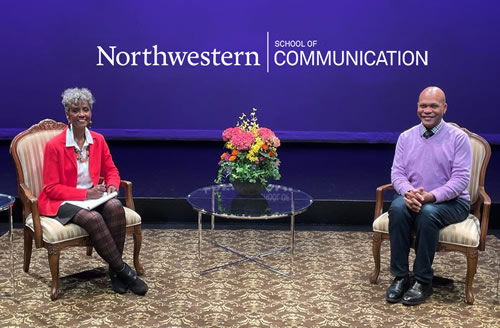
The School of Communication has a message for those long left out of the dialogue: we’re here, we’re listening, and we’re taking action.
In a frank, invitation-only discussion, Dorothy Tucker (C78)—a Chicago journalism mainstay and the president of the National Association of Black Journalists—interviewed Dean E. Patrick Johnson about his mission to identify and amplify the experiences of students, faculty, staff, and alumni of all underrepresented groups, but in particular those in the School of Communication’s Black community.
The hourlong April 7 Zoom event, “Elevating Black Voices,” covered much ground, including the ups and downs of being a Black student at the University, the story behind the dean’s name, how he wound up at Northwestern more than two decades ago, the challenges of starting his deanship in 2020, and the central focus of his administration: diversity, equity, and inclusion.
“One of the things that I’ve discovered about any leadership position is that people just want to be heard,” said Johnson. “That’s what I do in my own research. I’m an oral historian and I constantly talk to people about their lives. I’m invested in becoming a vessel, a platform for people to tell their stories, to be confirmed and affirmed.”
Tucker, a longtime television reporter and investigative journalist with Chicago CBS station WBBM, has won several Emmy Awards, the 2021 Greater Chicago Leaders Network Living Legacy Award, and the 2019 Chicago Defender Women of Excellence Award, among others. She is active in alumni networks and is married to alumnus Tony Wilkins. Tucker demonstrated her deft interviewing skills in her far-reaching yet personal questions—and she consistently kept the focus on the Black student and alumni experience, especially in terms of recruitment.
She recalled that when she graduated and started her professional journalism career, she began to see the dividends of her experience—that in the real world you had to fight for what you got. The Northwestern name opened doors, but if it weren’t for her inspiring Black professors, she might not have stayed at the University. And even with the great friends she made and the exemplary education she received, she felt something was missing—so it took her more than a decade to want to return to the Wildcat fold. Unfortunately, it’s an all too common experience among Northwestern’s Black graduates.
“If you want stronger alumni,” she said, “you’ve got to make the students feel loved.”
